#AI in academic research
Explore tagged Tumblr posts
Text
"But they use AI when they are doing real work all the time...!" Maybe so, but what do you think is the aim of the said work? Make a product, maybe?
If you think the aim of your schooling is to produce essays and spreadsheets, you are worse off than even I though
I just started grad school this fall after a few years away from school and man I did not realize how dire the AI/LLM situation is in universities now. In the past few weeks:
I chatted with a classmate about how it was going to be a tight timeline on a project for a programming class. He responded "Yeah, at least if we run short on time, we can just ask chatGPT to finish it for us"
One of my professors pulled up chatGPT on the screen to show us how it can sometimes do our homework problems for us and showed how she thanks it after asking it questions "in case it takes over some day."
I asked one of my TAs in a math class to explain how a piece of code he had written worked in an assignment. He looked at it for about 15 seconds then went "I don't know, ask chatGPT"
A student in my math group insisted he was right on an answer to a problem. When I asked where he got that info, he sent me a screenshot of Google gemini giving just blatantly wrong info. He still insisted he was right when I pointed this out and refused to click into any of the actual web pages.
A different student in my math class told me he pays $20 per month for the "computational" version of chatGPT, which he uses for all of his classes and PhD research. The computational version is worth it, he says, because it is wrong "less often". He uses chatGPT for all his homework and can't figure out why he's struggling on exams.
There's a lot more, but it's really making me feel crazy. Even if it was right 100% of the time, why are you paying thousands of dollars to go to school and learn if you're just going to plug everything into a computer whenever you're asked to think??
32K notes
·
View notes
Text
I am feeling very pessimistic about people's researching, reading and writing abilities at high levels of education. I'm currently at university to study Translation and absolutely everyone I've met uses AI for everything. Yes, even the teachers. Every week there's people I see using AI to write their essays, to translate things, to explain the difference between x and y, to see if they should use x term or y term, teachers asking for the students to tell them what does AI say about x... Every fucking week. It's tiresome. Instead of learning how to do things properly, how to look for texts that exemplify what you want, how to use dictionaries from a bilingual approach, how to organize your thoughts into a well-formed and comprehensive essay, instead of any of that, it's just AI. And these are all skills that need to be learnt to know how to do these things properly, so if you always depend on AI for them, you'll never know how to do them by yourself. This is an awful situatiom without even taking into account the enviromental consequences that AI has. I fucking hate it here, I hate knowing that I'm the modern equivalent of a luddite just because I don't use this shit, but you know what? Maybe the luddites were fucking right.
1 note
·
View note
Text
Accelerating AI to Improve Thesis Research and Academic Research
In the ever-changing academic landscape the integration of technology has changed the way that the research process is carried out, especially in the field of thesis writing. There are a many tools that are available, Photon Insights is the most notable as an effective AI tool to conduct academic research. This article explores the ways in which Photon Insights can enhance the research process for researchers and students alike, with a focus on its use for thesis writing as well as document administration.
The Rise of AI Tools for Academic Research
The academic community is now aware of the significance in AI devices for student as well as researchers. These tools simplify various aspects of research and make the process more effective and productive. Photon Insights, in particular provides a wide array of features to meet the demands of academic research and writing from document management through data processing.
Thesis Writing using Document Information
Thesis Writing is an incredibly multifaceted job that requires extensive analysis, collection of data and organizing. Photon Insights provides document insights which help researchers to synthesize data from a variety of sources. Through the use of advanced algorithms it is able to AI tool can pinpoint key themes, present findings and highlight relevant data that are crucial to creating a cohesive thesis.
For example when writing a thesis about climate change, students could input several academic research papers in Photon Insights. The program will then analyze the papers, removing essential information and providing the information in a format that is structured. This is not just time-saving but will also ensure that the student does lose out on important information that can help them in their argument.
Enhancing the Efficiency of Research with AI Instruments for Students
For students at university, the task of balancing academics and research is a daunting task. Photon Insights acts as an AI tool for students at universities that allows them to concentrate on analysis and critical thinking instead of being engulfed with administrative tasks. With features that facilitate the management of citations, data organization as well as literature review, they are able to concentrate more on creating their arguments and improving their writing.
Additionally, the user-friendly interface is accessible to students of all levels. If you’re a freshman undergraduate or an PhD candidate, users are able to effortlessly access the system and utilize its features to boost their academic achievements.
AI Tools for Researchers: A Competitive Edge
Professional researchers as well as researchers working in industry studies, Photon Insights provides advanced analytical capabilities, which are crucial for generating high-quality research. The capability of this tool to process large quantities of data mean that researchers are able to quickly spot gaps in the existing research, and thereby create new research questions and hypothesis.
Furthermore this AI tool facilitates collaboration between researchers. By integrating existing research networks and databases, Photon Insights enables users to share their findings and documents that are collaborative, and join in discussions. This creates a community of sharing knowledge and learning which can lead to revolutionary discoveries.
Document Management Made Easy
One of the biggest issues when conducting research in the academic world is coordinating the vast amount of data and documents. Photon Insights serves as an AI tool to manage documents and features that help in the process of organizing research materials. Documents can be categorize and tag the most important parts and establish a central collection of resources. This is not just helpful in ensuring a consistent process, but it also improves the overall experience.
For example, a research scientist researching social behavior might gather a large number of articles and reports over time. Photon Insights allows them to effectively handle these files, making sure that they are able to quickly access the information they require. The AI tools’ capabilities to manage documents reduce the chaos that is often involved in projects for research which results in greater efficiency.
Maximizing Research AI for Data Analysis
Data analysis is a vital part of any research especially for those engaged in empirical research. Photon Insights incorporates sophisticated data analytics capabilities, turning the raw data into valuable information. Utilizing machine learning algorithms, the software will identify patterns in data, patterns, and correlations in data sets, allowing researchers an knowledge of the findings.
This is particularly beneficial to researchers working in disciplines like social sciences, health sciences and economics in which data plays an essential part in forming conclusions. With the help of research AI researchers can improve the credibility and validity of their research, eventually resulting in higher-quality research output.
Customization for Diverse Research Needs
One of the advantages of Photon Insights lies in its ability to adapt to different research fields. If a researcher is focused on the humanities, sciences or engineering or engineering, it is an AI software can be customized to meet specific requirements. The customizable features permit users to modify templates, alter analytics parameters, and even configure methods for data extraction according to their specific subject of research.
This flexibility is what makes Photon Insights an invaluable asset for academic communities of all kinds. Researchers can conduct thorough research that is in alignment with their own research objectives and research methods.
The Future of Academic Research with AI
Looking to our futures, the use of AI in research at universities will grow more. Tools such as Photon Insights will continue to improve, with advanced features like natural analysis of languages predictive analytics, as well as enhanced collaboration capabilities. These new features can make the process of research easier, more intuitive and productive.
For researchers and students at universities who are in the university, the use of AI tools will not just enhance the quality of their academic research but also create an exciting and creative research environment. Through the use that are offered by Photon Insights, users can keep up with the times and conduct research that can make a significant contribution to their field.
Conclusion
In short, Photon Insights is a revolutionary AI tool used in academic research that greatly improves the quality of thesis writing and management of documents. Through streamlining processes, enhancing the analysis of data, and encouraging collaboration This AI tool is a valuable resource to both researchers and students. As the academic world expands to incorporate technological advancements, tools like Photon Insights will play a significant part for shaping research’s future, helping users to reach their academic goals more efficiently and with greater precision. It doesn’t matter if you’re a student working on your first dissertation or a veteran researcher working on difficult questions, Photon Insights is a must-have tool in your academic pursuit.
0 notes
Text
AI and Document Insights: Simplifying Complex Research problems with Photon Insights
AI and Document Insights: Simplifying Complex Research problems with Photon Insights
As research is an inexact science, keeping track of vast amounts of data can be daunting. Complicated projects often include reviewing multiple documents, extracting relevant insights from them, synthesizing findings from various sources and synthesizing these into one cohesive research report. Unfortunately, this process can be time consuming and subject to human error, making accuracy and efficiency an ongoing struggle for researchers. Thanks to Artificial Intelligence (AI), platforms like Photon Insights are revolutionizing how researchers handle document insights; streamlining complex projects more efficiently while increasing productivity — this article explores how AI improves document insights while Photon Insights helps researchers navigate projects more successfully than ever before!
Researching Document Insights to Gain New Insights
Documenting insights is vital for researchers across disciplines for multiple reasons, including:
1. Information Overload: Researchers often face an overwhelming amount of information from academic articles, reports, and studies that needs to be processed efficiently to obtain valuable insights for meaningful analysis. Extracting key insights efficiently is paramount.
2. Improved Understanding: Accurate insights help researchers grasp complex topics, identify trends and understand the repercussions of their findings.
3. Evidence-Based Decision Making: Documented insights enable researchers to support their conclusions with solid evidence, which is key for maintaining credibility within academic and corporate environments.
4. Streamlined Collaboration: When conducting multidisciplinary research projects, sharing insights among team members is paramount for cohesive progress and informed decision-making.
Challenges Involve Traditional Document Analysis
Traditional methods for document analysis present several hurdles.
1. Time-Consuming Processes: Reviewing and extracting information from numerous documents manually can take considerable time, limiting research progress.
2. Risk of Human Error: Manual analysis can lead to inaccuracies due to human interpretation, leading to discrepancies and discrepancies within data.
3. Difficulties with Handling Unstructured Data: Research data often contains unstructured content that makes analysis and derivation of insights difficult without using specialist software tools.
4. Limited Collaboration: Sharing insights between team members can be cumbersome when using static documents and manual processes as means for sharing insight.
How AI Is Transforming Document Insights
Document analysis with artificial intelligence (AI) offers several significant advantages for researchers looking to simplify complex projects:
Automated Data Extraction Processes (ADEPs)
AI algorithms can automatically extract relevant data from documents, significantly shortening manual analysis time and freeing researchers up to focus on interpreting their findings rather than collecting information.
Keyword Focus: Automated Data Extraction and Time Efficiency
Photon Insights employs advanced data extraction techniques that enable researchers to quickly gather insights from various documents, streamlining their workflow.
2. Natural Language Processing (NLP)
Natural Language Processing (NLP) allows AI to understand human language, providing insights from unstructured sources like articles and reports. NLP identifies key themes, concepts, and sentiments that make complex texts easier for researchers to grasp the main points.
Keyword Focus: Natural Language Processing and Text Analysis
Researchers can leverage Photon Insights’ NLP capabilities to extract meaningful insights from large volumes of documents, deepening their understanding of complex subjects.
Enhance Search Capabilities
AI-powered search functions allow researchers to query documents using natural language, and return results that are contextual rather than simply keyword matching. This feature improves accuracy and efficiency of research processes.
Keyword Focus: Improve Search, Contextual Queries
Photon Insights provides advanced search functionalities that enable users to quickly locate the information they require, creating smoother research workflows.
Intelligent Summarization (ISS)
AI can produce concise summaries of lengthy documents, outlining only the key information. This allows researchers to quickly assess which documents warrant further study and make informed decisions.
Keyword Focus: Intelligent Summarization, Rapid Insights
Photon Insights provides intelligent summarization tools to enable researchers to gain quick and immediate insights from large amounts of text, saving both time and effort in the process.
5. Collaborative Features
AI-driven platforms can enhance collaboration by allowing team members to easily share insights, comments, and annotations in real time — an indispensable feature that ensures all team members stay informed throughout the research process.
Keyword Focus: Collaborative Features, Real-Time Sharing
Photon Insights encourages collaboration among researchers by enabling them to engage with each other’s findings and insights seamlessly — thus creating a more productive research environment.
Photon Insights Advantage
Photon Insights stands out as an invaluable tool for researchers seeking to leverage AI for document insights. Here’s how it enhances research experiences:
1. Comprehensive Document Management system.
Photon Insights allows users to efficiently organize and manage their documents, providing easy access to relevant materials — an essential step in maintaining an efficient research workflow.
2. User-Friendly Interface
The platform’s intuitive user interface makes navigating documents and extracting insights much simpler, making it ideal for researchers of all skill levels.
3. Customizable Dashboards
Researchers can create customized dashboards that represent their specific research interests and priorities, providing for more focused data analysis and insights.
Integration of Other Tools
Photon Insights provides users with seamless integration between various research tools and databases, enabling them to streamline their workflows and maximize research capabilities.
5. Continuous Development and Learning
Photon Insights’ AI algorithms learn from user interactions, continually honing in on relevance for each researcher to ensure they get the most relevant and up-to-date results possible. This ensures they receive relevant and valuable data.
Case Studies of Success With Photon Insights
Consider these case studies as examples of AI’s effectiveness in document insights:
Case Study 1: Academic Research
Academic researchers investigating climate change made use of Photon Insights to rapidly review hundreds of scientific articles. With its automated data extraction and intelligent summarization features, this team was able to synthesize critical findings more quickly for publication as an extensive review paper with wide appeal.
Case Study 2: Corporate Analysis
Photon Insights helped a corporate research department streamline their market analysis process. Utilizing its NLP capabilities, the team were able to extract sentiment data from industry reports and news articles, providing real-time market intelligence insights for informed strategic decisions.
Case Study 3 — Healthcare Research
Photon Insights was used by a healthcare research group to analyze patient data and clinical studies. With its automated extraction of relevant insights, the team were able to quickly identify trends in treatment outcomes which ultimately resulted in improved care strategies and protocols.
Future Photon Insights and Document Insights
As AI technology develops further, its role in document insights may grow increasingly significant. A number of trends may determine its development:
1. Greater Automation & Designing : Automating document analysis will further increase efficiency, enabling researchers to focus on interpretation and application instead.
2. Advancement in AI Capabilities: Advancements in artificial intelligence algorithms will increase both accuracy and depth of insights drawn from complex documents.
3. Emerging Technologies: When combined, AI and emerging technologies such as blockchain and augmented reality could create new avenues for document insights and analysis.
4. Emphasis on Ethical AI: As AI becomes more integrated into research, attention to ethical considerations will become ever more essential to ensure fairness, transparency, and accountability.
AI is revolutionizing how researchers manage document insights, streamlining complex projects and improving overall efficiency. From automating data extraction and natural language processing to intelligent summarization capabilities, AI enables researchers to navigate large volumes of information with ease.
Photon Insights stands at the forefront of this transformation, offering an AI-powered suite of tools designed to optimize document analysis and foster collaboration. As research requirements increase, adopting solutions like Photon Insights will become essential in meeting those demands while increasing productivity and gaining insights. With so much data out there already available online, AI solutions such as Photon Insights offer key differentiators that will lead to success both academically and corporately alike.
0 notes
Text
usually i don't advocate for narc-ing, but in this case I will just remind you that your school or college probably considers use of AI an act of academic dishonesty (akin to plagiarism)
just FYI
source: I work in higher ed, plus we're literally dealing with a case about this right now
ur future nurse is using chapgpt to glide thru school u better take care of urself
#ai#ai art#ai in academic research#there is no justification for using ai to shortcut your way to a degree
132K notes
·
View notes
Text
Accelerating AI to Improve Thesis Research and Academic Research
Accelerating AI to Improve Thesis Research and Academic Research
In the ever-changing academic landscape the integration of technology has changed the way that the research process is carried out, especially in the field of thesis writing. There are a many tools that are available, Photon Insights is the most notable as an effective AI tool to conduct academic research. This article explores the ways in which Photon Insights can enhance the research process for researchers and students alike, with a focus on its use for thesis writing as well as document administration.
The Rise of AI Tools for Academic Research
The academic community is now aware of the significance in AI devices for student as well as researchers. These tools simplify various aspects of research and make the process more effective and productive. Photon Insights, in particular provides a wide array of features to meet the demands of academic research and writing from document management through data processing.
Thesis Writing using Document Information
Thesis Writing is an incredibly multifaceted job that requires extensive analysis, collection of data and organizing. Photon Insights provides document insights which help researchers to synthesize data from a variety of sources. Through the use of advanced algorithms it is able to AI tool can pinpoint key themes, present findings and highlight relevant data that are crucial to creating a cohesive thesis.
For example when writing a thesis about climate change, students could input several academic research papers in Photon Insights. The program will then analyze the papers, removing essential information and providing the information in a format that is structured. This is not just time-saving but will also ensure that the student does lose out on important information that can help them in their argument.
Enhancing the Efficiency of Research with AI Instruments for Students
For students at university, the task of balancing academics and research is a daunting task. Photon Insights acts as an AI tool for students at universities that allows them to concentrate on analysis and critical thinking instead of being engulfed with administrative tasks. With features that facilitate the management of citations, data organization as well as literature review, they are able to concentrate more on creating their arguments and improving their writing.
Additionally, the user-friendly interface is accessible to students of all levels. If you’re a freshman undergraduate or an PhD candidate, users are able to effortlessly access the system and utilize its features to boost their academic achievements.
AI Tools for Researchers: A Competitive Edge
Professional researchers as well as researchers working in industry studies, Photon Insights provides advanced analytical capabilities, which are crucial for generating high-quality research. The capability of this tool to process large quantities of data mean that researchers are able to quickly spot gaps in the existing research, and thereby create new research questions and hypothesises.
Furthermore this AI tool facilitates collaboration between researchers. By integrating existing research networks and databases, Photon Insights enables users to share their findings and documents that are collaborative, and join in discussions. This creates a community of sharing knowledge and learning which can lead to revolutionary discoveries.
Document Management Made Easy
One of the biggest issues when conducting research in the academic world is coordinating the vast amount of data and documents. Photon Insights serves as an AI tool to manage documents and features that help in the process of organizing research materials. Documents can be categorize and tag the most important parts and establish a central collection of resources. This is not just helpful in ensuring a consistent process, but it also improves the overall experience.
For example, a research scientist researching social behavior might gather a large number of articles and reports over time. Photon Insights allows them to effectively handle these files, making sure that they are able to quickly access the information they require. The AI tools’ capabilities to manage documents reduce the chaos that is often involved in projects for research which results in greater efficiency.
Maximizing Research AI for Data Analysis
Data analysis is a vital part of any research especially for those engaged in empirical research. Photon Insights incorporates sophisticated data analytics capabilities, turning the raw data into valuable information. Utilizing machine learning algorithms, the software will identify patterns in data, patterns, and correlations in data sets, allowing researchers an knowledge of the findings.
This is particularly beneficial to researchers working in disciplines like social sciences, health sciences and economics in which data plays an essential part in forming conclusions. With the help of research AI researchers can improve the credibility and validity of their research, eventually resulting in higher-quality research output.
Customization for Diverse Research Needs
One of the advantages of Photon Insights lies in its ability to adapt to different research fields. If a researcher is focused on the humanities, sciences or engineering or engineering, it is an AI software can be customized to meet specific requirements. The customizable features permit users to modify templates, alter analytics parameters, and even configure methods for data extraction according to their specific subject of research.
This flexibility is what makes Photon Insights an invaluable asset for academic communities of all kinds. Researchers can conduct thorough research that is in alignment with their own research objectives and research methods.
The Future of Academic Research with AI
Looking to our futures, the use of AI in research at universities will grow more. Tools such as Photon Insights will continue to improve, with advanced features like natural analysis of languages predictive analytics, as well as enhanced collaboration capabilities. These new features can make the process of research easier, more intuitive and productive.
For researchers and students at universities who are in the university, the use of AI tools will not just enhance the quality of their academic research but also create an exciting and creative research environment. Through the use that are offered by Photon Insights, users can keep up with the times and conduct research that can make a significant contribution to their field.
Conclusion
In short, Photon Insights is a revolutionary AI tool used in academic research that greatly improves the quality of thesis writing and management of documents. Through streamlining processes, enhancing the analysis of data, and encouraging collaboration This AI tool is a valuable resource to both researchers and students. As the academic world expands to incorporate technological advancements, tools like Photon Insights will play a significant part for shaping research’s future, helping users to reach their academic goals more efficiently and with greater precision. It doesn’t matter if you’re a student working on your first dissertation or a veteran researcher working on difficult questions, Photon Insights is a must-have tool in your academic pursuit.
0 notes
Text
Role of AI Using Photon Insights in Academic Research
Role of AI Using Photon Insights in Academic Research
In the constantly evolving academic research landscape the use technology such as AI (AI) has become more important. Within the array of AI instruments, Photon Insights stands out as a powerful tool for students, researchers and academic institutions. This article explains the ways in which Photon Insights AI is reshaping academic research, increasing efficiency and streamlining the process of managing documents.
Understanding Photon Insights in AI
Photon Insights is a powerful AI tool designed specifically to aid research in academia. It makes use of advanced methods of machine learning and algorithms to analyse massive amounts of data. It provides researchers with insights that will dramatically improve their research. Through providing user-friendly tools for managing documents and study analysis Photon Insights has positioned itself as a vital partner to anyone who is who is involved in academic endeavors.
Key Features of Photon Insights for academic research
1. Document Management Document Management: One of the main advantages in Photon Insights is its robust document management capabilities. Researchers often struggle with the management of large collections of academic articles, papers as well as data sets. This AI tool makes it easier by automating the management of documents, categorization, the retrieval and organization of papers. Through the use of AI to provide insights into documents users will spend less time looking for information and spend more time conducting relevant research.
2.Data analysis: Photon Insights employs sophisticated analytical tools that allow you to sift through large amounts of data quickly. This feature is especially beneficial for researchers working with massive amounts of data, allowing researchers to discover patterns, trends, and correlations patterns that are not easily identified by manual analysis.
3. Collaboration Tools For academia, collaboration usually essential to the success of research. Photon Insights allows seamless collaboration between students and researchers. Through its shared workspace teams can collaborate on projects, collaborate on documents, and converse effectively regardless of place of residence.
4. Personalized Recommendations: Using machines learning techniques, Photon Insights can offer customized content recommendations in response to a user’s interests in research. This function aids researchers and students to find relevant sources and publications and accelerates the process of researching.
5. Plagiarism Detection: Keeping academic integrity is vital for research. Photon Insights has advanced plagiarism detection tools which allow researchers to make sure that their work is original and correctly acknowledged. This feature is helpful for students who are navigating their academic path.
Academic Research
For University Students
AI tools for students in universities including Photon Insights, are redefining the way that academic work is conducted. With the increasing demands for efficient research techniques, students can benefit from these AI tool to boost their efficiency. If it’s creating an essay or conducting literature reviews or preparing presentations Photon Insights will provide students with the tools and knowledge to succeed in their research.
Students can, for instance, make use of the document management tools to manage their research materials efficiently. It is possible to rapidly access and review relevant documents can save time and allows students to remain focused on their primary academic goals.
For Researchers
For experienced researchers, Photon Insights serves as an essential support in research. This AI software for scientists is capable of handling huge quantities of data and provide insight into the analytical process that can improve the quality and quantity of the research results. This feature is especially useful in areas like social sciences, health sciences, and engineering in which large data sets are the norm.
Furthermore, the tools for collaboration integrated into Photon Insights allow researchers to join with peers as they share research findings and collaborate on papers without the usual logistics hurdles. This connectivity fosters a more collaboration-based research environment that leads to greater academic output.
For Industrial Research
In the field of industrial research, Photon Insights offers unique advantages. Researchers that conduct applied research may make use of the AI tool to simplify their research procedures, gain insight into trends in the market, and improve the process of developing products. Through adding Photon Insights into their research framework industrial researchers can enhance their ability to manage and analyze data which will result in more informed decisions.
Document Insights and Management
The significance of document management can’t be overemphasized for academic studies. Photon Insights enhances document insights by using AI-driven categorization and retrieval systems. Researchers can automate the categorization of documents allowing them to find the information required. This allows researchers to concentrate more time on analysis and interpretation, rather than administration tasks.
Future of Research with AI: The Future of Research with AI
While AI technologies continue to advance the possibilities for tools such as Photon Insights to further transform research at universities is huge. In the future, we could see advanced features like predictive analytics that are able to anticipate the trends in research or better natural language processing capabilities that will make the literature reviews more effective.
In addition in the future, as schools increasingly use AI tools to conduct research in the academic field, the nature of education itself will change. Teachers can incorporate tools such as Photon Insights into their curricula and equip students with the knowledge to use and navigate AI for their future career.
Conclusion
Photon Insights AI is an important technological advancement in research in the academic field. It provides essential features like managing documents, data analyses along with collaboration capabilities, the software enables both students and researchers to increase their efficiency and increase overall quality and efficiency of research. In the years ahead, as AI techniques for research in academia continue to evolve, Photon Insights will undoubtedly be a key factor for shaping research’s future and making it more effective and accessible more than it has ever been before.
In short that, whether you’re a student at a university looking to increase your research abilities or an experienced researcher seeking to streamline your workflow or an industrial researcher looking to increase your competitive advantage, Photon Insights is the AI tool that will aid you in reaching your objectives. The adoption of AI technology will play a crucial role in the coming years of discovery and exploration in the academic world.
0 notes
Text

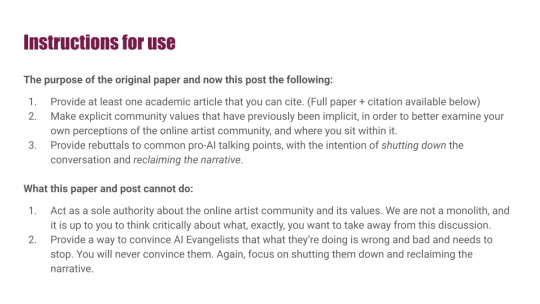
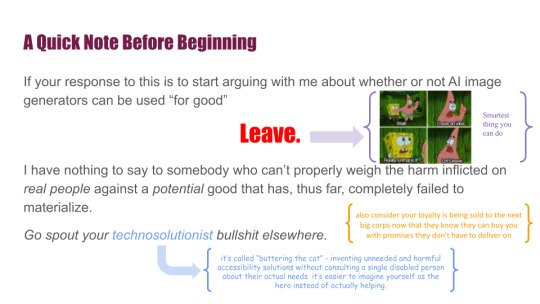
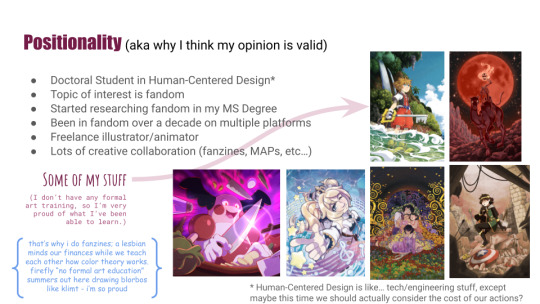
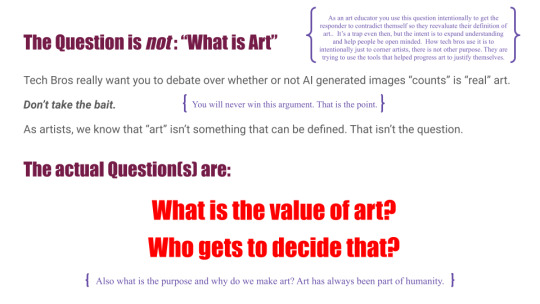
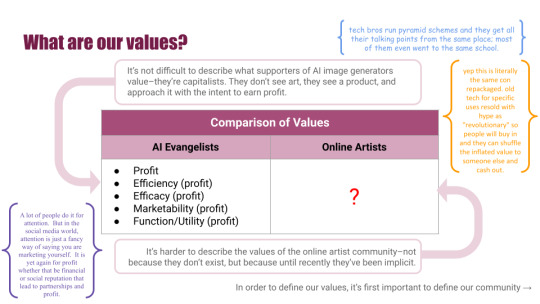

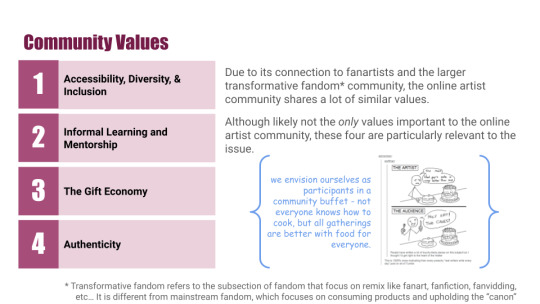
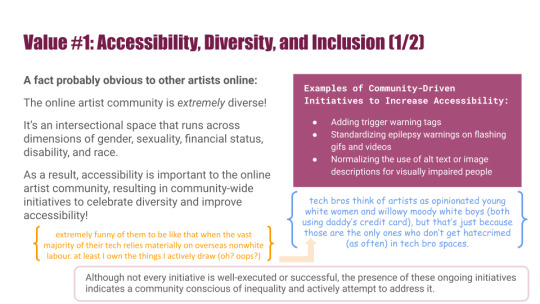
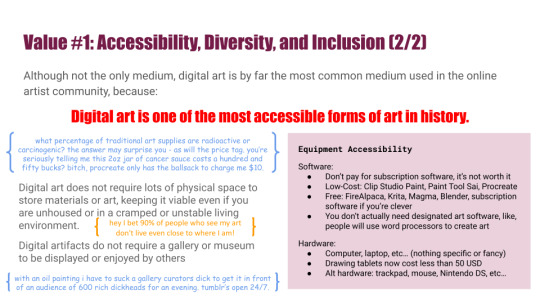
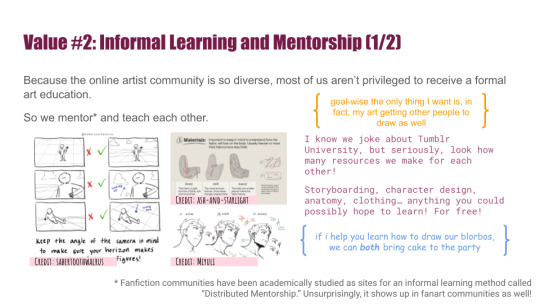
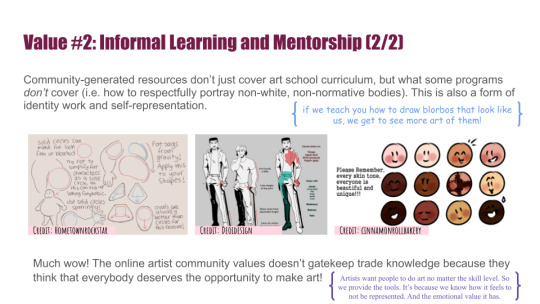




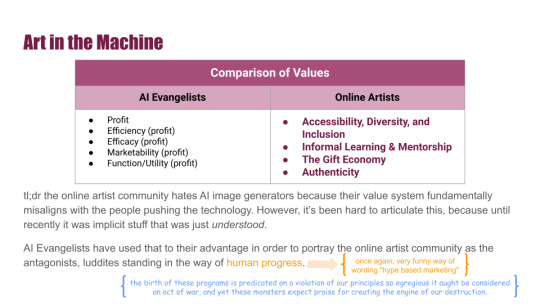

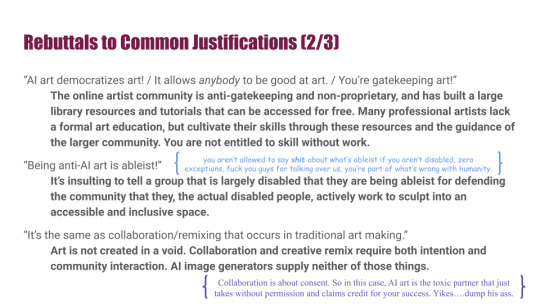
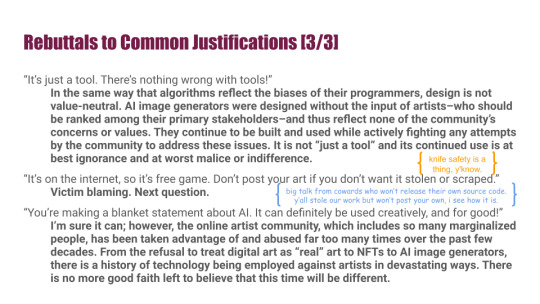
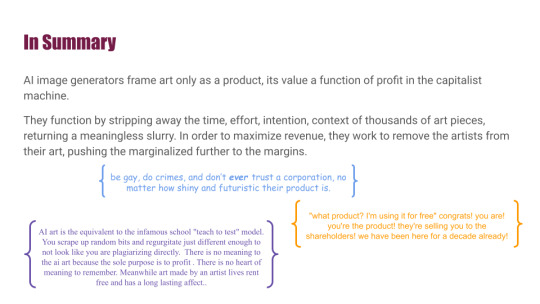
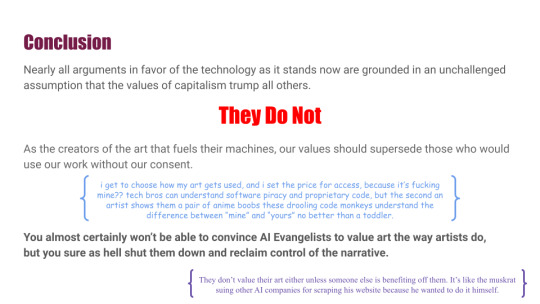
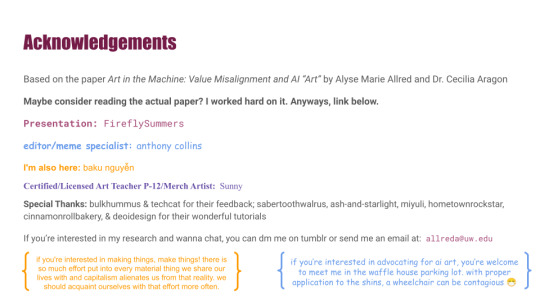
FireflySummers’ Guide to Arguing Against the Use of AI Image Generators
(AKA I hate AI image generators so fucking much that I published a whole ass academic article on it)
Read the Paper: Art in the Machine: Value Misalignment and AI "Art"
Citation: Allred, A.M., Aragon, C. (2023). Art in the Machine: Value Misalignment and AI “Art”. In: Luo, Y. (eds) Cooperative Design, Visualization, and Engineering. CDVE 2023. Lecture Notes in Computer Science, vol 14166. Springer, Cham. https://doi.org/10.1007/978-3-031-43815-8_4
The purpose of the original paper and now this post is the following:
Provide at least one academic article that you can cite. (Full paper + citation available below)
Make explicit community values that have previously been implicit, in order to better examine your own perceptions of the online artist community, and where you sit within it.
Provide rebuttals to common pro-AI talking points, with the intention of shutting down the conversation and reclaiming the narrative.
What this paper and post cannot do:
Act as a sole authority about the online artist community and its values. We are not a monolith, and it is up to you to think critically about what, exactly, you want to take away from this discussion.
Provide a way to convince AI Evangelists that what they’re doing is wrong and bad and needs to stop. You will never convince them. Again, focus on shutting them down and reclaiming the narrative.
Final Disclaimer: I'm a very fallible researcher who is still very much learning how to do academia. I cannot speak for the entirety of the online artist community or fanartist community. We all have different lived experiences. I have done my best to include diverse voices; however if you have concerns or critiques, I am open to hearing them.
If you show up to debate in favor of AI image generators, you will be automatically blocked.
Credits:
Editors, Meme Experts, and Annotators: @starbeans-bags, @b4kuch1n, @cecilioque.
Tutorial Examples: @sabertoothwalrus, @ash-and-starlight, @miyuliart, @hometownrockstar, @deoidesign, @cinnamonrollbakery
If you have read this far, thank you very much. I hope that you have found a constructive lens for approaching the war with AI image generators, as well as a new tool for shutting down debate and reclaiming the narrative.
#anti ai#fuck ai#fuck ai everything#fuck ai bros#anti ai art#ai is theft#ai is a plague#fandom#fandom research#fanart#my academics#that's a new tag for me#long post
3K notes
·
View notes
Text
Research Study: Fandom & Generative AI still looking for participants!
I'm still recruiting research participants for my PhD dissertation study!!! If you've already participated, thanks so much! If you haven't participated yet, please consider responding to a quick survey, and sharing with your friends!
I'm interested in understanding fans' perspectives on and experiences with generative AI (text and image generation software). That means perceptions both positive and negative! However you feel about genAI, I'm interested in hearing from you. We're especially seeking diverse perspectives from underrepresented demographic groups of people.
If you're over 18, can speak/understand English, and are interested in participating you can learn more information and take the survey here. I've also made a FAQ post about the study that I've pinned to the top of the blog, and you can see more info on the shareable flyer below. You can also view posts on Twitter/X, Bluesky, and Reddit about the study and share info there! Spreading the word is greatly appreciated :)

The study is anonymous and voluntary, and you'll be asked about your fandom background, attitudes towards generative AI, and demographic information. The survey should take about 15-20 minutes, and you can skip over any questions you want. You can also elect to participate in a follow up interview, if you want to. The full details are on the consent form, which you'll be able to read before taking the survey! Feel free to reach out with any questions.
#fanfic#fandom#fanart#ai#art#writing#fan culture#fandom meta#fandom culture#fandom things#research#research study#fan fiction#fan art#fanfiction#ao3 fanfic#fic writing#artificial intelligence#technology#creative writing#creation#creativity#fandom polls#fandom research#fan studies#academic research#research survey#artists on tumblr#writers on tumblr#anime and manga
118 notes
·
View notes
Text
STUDENTS! RESEARCHERS!
I got a lil tricky trick for you;
You can use chatgpt to write highly specific database/library search strings. I realise not everyone is good at this skill so having a tool do it for you can be really beneficial for big literature reviews et cetera.
Try it sometime!
#study#studyblr#student#students#research#researchers#academia#academic#chatgpt#ai#artificial intelligence
23 notes
·
View notes
Text

Foundations in Flux: Rethinking Quantum Mechanics
At the forefront of modern scientific inquiry lies the intriguing convergence of philosophy and physics, particularly within the realm of quantum mechanics. A discourse with Professor Jacob Barandes, a scholar bridging fundamental physics and philosophical introspection, offers a nuanced exploration of this intersection.
Challenging the orthodox view, Professor Barandes posits wave functions as mathematical constructs generating probabilities, rather than physical entities inhabiting space. This paradigm shift underscores the notion that quantum mechanics' peculiarities may originate from its representational framework, rather than the intrinsic nature of physical systems. By demoting wave functions from ontological status to epistemological utility, we may uncover a more parsimonious explanation for quantum phenomena.
The introduction of C*-algebras as an alternative, mathematically equivalent formulation, prompts a reassessment of Hilbert spaces' foundational role. This approach, highlighting the potential redundancy of Hilbert spaces in certain quantum systems, invites a critical examination of quantum mechanics' axiomatic underpinnings. The implications are far-reaching, suggesting that a reevaluation of quantum theory's foundations may yield novel insights into the nature of reality.
Eugene Wigner's thought-provoking experiment serves as a catalyst for exploring the intricate dance between consciousness, wave function collapse, and the observer's role. By interrogating the fundamental status of wave functions and Hilbert spaces, Professor Barandes' framework may provide a novel lens through which to resolve the measurement problem, thereby illuminating the complex interplay between observation, reality, and the quantum realm.
Professor Barandes' "deflationary" approach, seeking to clarify quantum mechanics by positing a more intuitive, classical-like ontology, warrants careful consideration. By modeling quantum systems as probabilistic, classical entities governed by indivisible stochastic processes, this perspective potentially reconciles the theory's interpretational ambiguities. However, the success of this endeavor hinges on its capacity to generate empirically distinguishable predictions, thus necessitating rigorous experimental verification.
Jacob Barandes: There's No Wave Function? (Curt Jaimungal, Theories of Everything, November 2024)
youtube
Thursday, November 14, 2024
#philosophy of physics#quantum mechanics#interdisciplinary studies#science and philosophy#theoretical physics#academic research#scientific inquiry#philosophical perspectives on science#interview#ai assisted writing#machine art#Youtube
10 notes
·
View notes
Text
AI Research Project
Hello!! I’m doing my English final on AI and decided to make a form to get more responses. It is all anonymous unless you choose to give a name at the end. Please take your time and give whatever answers is honest to your opinion. Thank you
https://docs.google.com/forms/d/e/1FAIpQLSdZp12uaWJqHW8tZIJf8FRAdTA2vSY1LT4qYBKBJMQ7RDHQFg/viewform?usp=sf_link
#main blog moment#main tumblr#form#google form#anonymous form#AI#ai form#collecting research#collecting responses#tumblr#school related#academic related#Google forms#I’ll reblog on my other accounts too#please answer#personal use only
5 notes
·
View notes
Text
AI and Ethical Challenges in Academic Research
When Artificial Intelligence (AI) becomes more and more integrated into research in academia and practice, it opens up both new opportunities and major ethical issues. Researchers can now utilize AI to study vast amounts of data for patterns, identify patterns, and even automate complicated processes. However, the rapid growth of AI within academia poses serious ethical questions about privacy, bias, transparency and accountability. Photon Insights, a leader in AI solutions for research, is dedicated to addressing these issues by ensuring ethical considerations are on the leading edge of AI applications in the academic world.
The Promise of AI in Academic Research
AI has many advantages that improve the effectiveness and efficiency of research in academia:
1. Accelerated Data Analysis
AI can process huge amounts of data in a short time, allowing researchers to detect patterns and patterns which would require humans much longer to discover.
2. Enhanced Collaboration
AI tools allow collaboration between researchers from different institutions and disciplines, encouraging the exchange of ideas and data.
3. Automating Routine Tasks Through the automation of repetitive tasks AI lets researchers focus on more intricate and innovative areas of work. This leads to more innovation.
4. Predictive analytics: AI algorithms can forecast outcomes by analyzing the past, and provide useful insights for designing experiments and testing hypotheses.
5. “Interdisciplinary Research: AI can bridge gaps between disciplines, allowing researchers to draw from a variety of data sets and methods.
Although these benefits are significant but they also raise ethical issues that should not be ignored.
Ethical Challenges in AI-Driven Research
1. Data Privacy
One of the biggest ethical concerns with AI-driven research is the privacy of data. Researchers frequently work with sensitive data, which includes personal information of participants. In the use of AI tools raises concerns about the methods used to collect this data, stored, and then analyzed.
Consent and Transparency: It is essential to obtain an informed consent from the participants on using their personal data. This requires being transparent regarding how data is utilized and making sure that participants are aware of the consequences on AI analysis.
Data Security: Researchers need to implement effective security measures to guard sensitive data from breaches and unauthorized access.
2. Algorithmic Bias
AI models are only as effective as the data they’re training on. If data sets contain biases, whether based on gender, race socioeconomic status, gender, or other factors, the resultant AI models may perpetuate these biases, which can lead to biased results and negative consequences.
Fairness in Research Researchers should critically evaluate the data they collect to ensure that they are accurate and impartial. This means actively looking for different data sources and checking AI outputs for any potential biases.
Impact on Findings
Biased algorithms could alter research findings, which can affect the reliability of the conclusions drawn, and creating discriminatory practices in areas such as education, healthcare and social sciences.
3. Transparency and Accountability
The complex nature of AI algorithms can result in the “black box” effect, in which researchers are unable to comprehend the process of making decisions. The lack of transparency creates ethical questions concerning accountability.
Explainability Researchers must strive for explicable AI models that enable them to comprehend and explain the process of making decisions. This is crucial when AI is used to make critical decision-making in areas such as public health or the formulation of policies.
Responsibility for AI Results Establishing clearly defined lines of accountability is essential. Researchers must be accountable for the consequences for using AI tools, making sure they are employed ethically and with integrity.
4. Intellectual Property and Authorship
AI tools can create original content, which raises questions regarding the rights to intellectual property and authorship. Who owns the outcomes produced from AI systems? AI system? Do AI contributions be recognized in the publication of papers?
Authorship Guidelines Academic institutions should create clear guidelines on how to use AI when conducting research or authorship and attribution. This ensures that all contributions — whether human or machine — are appropriately recognized.
Ownership of Data institutions must identify who is the person responsible for the data utilized to run AI systems, especially when they are involved in collaborative research with different industries or institutions.
Photon Insights: Pioneering Ethical AI Solutions
Photon Insights is committed to exploring the ethical implications of AI in research in academia. The platform provides tools that focus on ethical concerns while maximizing the value of AI.
1. Ethical Data Practices
Photon Insights emphasizes ethical data management. The platform assists researchers to implement the best practices in data collection consent, security, and privacy. The platform includes tools to:
Data Anonymization: ensuring that sensitive data remains secure while providing an analysis that is valuable.
Informed Consent Management: Facilitating transparent information about the usage of data to the participants.
2. Bias Mitigation Tools
To combat bias in algorithms, Photon Insights incorporates features that allow researchers to:
Audit Datasets Identify and correct errors in the data prior to making use of it for AI training.
Monitor AI Outputs: Continually examine AI-generated outputs to ensure accuracy and fairness and alerts about possible biases.
3. Transparency and Explainability
Photon Insights is a leader in explaining AI by offering tools that improve transparency:
Model Interpretability Researchers can see and comprehend the decision-making process in AI models, which allows for clearer dissemination of the results.
Comprehensive Documentation — The platform promotes thorough documentation of AI methods, which ensures transparency in research methods.
4. Collaboration and Support
Photon Insights fosters collaboration among researchers as well as institutions and industry participants, encouraging the ethics of the use and application of AI by:
Community Engagement Engaging in discussions on ethics-based AI methods within research communities.
Educational Resources Training and information on ethical issues when conducting AI research, and ensuring that researchers are aware.
The Future of AI in Academic Research
As AI continues to develop and become more ethical, the ethical issues that it poses need to be addressed regularly. The academic community needs to take an active approach to tackle these issues, and ensure that AI is utilized ethically and responsibly.
1. “Regulatory Frameworks” Creating guidelines and regulations for AI application in the field of research is crucial in protecting privacy of data and guaranteeing accountability.
2. Interdisciplinary Collaboration: Collaboration between ethicists, data scientists and researchers will create an holistic way of approaching ethical AI practices, making sure that a variety of viewpoints are considered.
3. Continuous Education: Constant education and training in ethical AI techniques will allow researchers to better understand the maze of AI in their research.
Conclusion
AI has the potential to change the way academic research is conducted by providing tools to increase efficiency and boost innovations. However, the ethical concerns that come with AI should be addressed to ensure that it is used in a responsible manner. Photon Insights is leading the campaign to promote ethical AI practices and provides researchers with the tools and assistance they require to navigate through this tangled landscape.
In focusing on ethical considerations in academic research, researchers can benefit from the power of AI while maintaining the principles of fairness, integrity and accountability. It is likely that the future for AI in research at the university is promising and, with the appropriate guidelines set up, it will be a powerful force to bring about positive change in the world.
0 notes
Text
Accelerating AI to Improve Thesis Research and Academic Research
Accelerating AI to Improve Thesis Research and Academic Research
In the ever-changing academic landscape the integration of technology has changed the way that the research process is carried out, especially in the field of thesis writing. There are a many tools that are available, Photon Insights is the most notable as an effective AI tool to conduct academic research. This article explores the ways in which Photon Insights can enhance the research process for researchers and students alike, with a focus on its use for thesis writing as well as document administration.
The Rise of AI Tools for Academic Research
The academic community is now aware of the significance in AI devices for student as well as researchers. These tools simplify various aspects of research and make the process more effective and productive. Photon Insights, in particular provides a wide array of features to meet the demands of academic research and writing from document management through data processing.
Thesis Writing using Document Information
Thesis Writing is an incredibly multifaceted job that requires extensive analysis, collection of data and organizing. Photon Insights provides document insights which help researchers to synthesize data from a variety of sources. Through the use of advanced algorithms it is able to AI tool can pinpoint key themes, present findings and highlight relevant data that are crucial to creating a cohesive thesis.
For example when writing a thesis about climate change, students could input several academic research papers in Photon Insights. The program will then analyze the papers, removing essential information and providing the information in a format that is structured. This is not just time-saving but will also ensure that the student does lose out on important information that can help them in their argument.
Enhancing the Efficiency of Research with AI Instruments for Students
For students at university, the task of balancing academics and research is a daunting task. Photon Insights acts as an AI tool for students at universities that allows them to concentrate on analysis and critical thinking instead of being engulfed with administrative tasks. With features that facilitate the management of citations, data organization as well as literature review, they are able to concentrate more on creating their arguments and improving their writing.
Additionally, the user-friendly interface is accessible to students of all levels. If you’re a freshman undergraduate or an PhD candidate, users are able to effortlessly access the system and utilize its features to boost their academic achievements.
AI Tools for Researchers: A Competitive Edge
Professional researchers as well as researchers working in industry studies, Photon Insights provides advanced analytical capabilities, which are crucial for generating high-quality research. The capability of this tool to process large quantities of data mean that researchers are able to quickly spot gaps in the existing research, and thereby create new research questions and hypothesises.
Furthermore this AI tool facilitates collaboration between researchers. By integrating existing research networks and databases, Photon Insights enables users to share their findings and documents that are collaborative, and join in discussions. This creates a community of sharing knowledge and learning which can lead to revolutionary discoveries.
Document Management Made Easy
One of the biggest issues when conducting research in the academic world is coordinating the vast amount of data and documents. Photon Insights serves as an AI tool to manage documents and features that help in the process of organizing research materials. Documents can be categorize and tag the most important parts and establish a central collection of resources. This is not just helpful in ensuring a consistent process, but it also improves the overall experience.
For example, a research scientist researching social behavior might gather a large number of articles and reports over time. Photon Insights allows them to effectively handle these files, making sure that they are able to quickly access the information they require. The AI tools’ capabilities to manage documents reduce the chaos that is often involved in projects for research which results in greater efficiency.
Maximizing Research AI for Data Analysis
Data analysis is a vital part of any research especially for those engaged in empirical research. Photon Insights incorporates sophisticated data analytics capabilities, turning the raw data into valuable information. Utilizing machine learning algorithms, the software will identify patterns in data, patterns, and correlations in data sets, allowing researchers an knowledge of the findings.
This is particularly beneficial to researchers working in disciplines like social sciences, health sciences and economics in which data plays an essential part in forming conclusions. With the help of research AI researchers can improve the credibility and validity of their research, eventually resulting in higher-quality research output.
Customization for Diverse Research Needs
One of the advantages of Photon Insights lies in its ability to adapt to different research fields. If a researcher is focused on the humanities, sciences or engineering or engineering, it is an AI software can be customized to meet specific requirements. The customizable features permit users to modify templates, alter analytics parameters, and even configure methods for data extraction according to their specific subject of research.
This flexibility is what makes Photon Insights an invaluable asset for academic communities of all kinds. Researchers can conduct thorough research that is in alignment with their own research objectives and research methods.
The Future of Academic Research with AI
Looking to our futures, the use of AI in research at universities will grow more. Tools such as Photon Insights will continue to improve, with advanced features like natural analysis of languages predictive analytics, as well as enhanced collaboration capabilities. These new features can make the process of research easier, more intuitive and productive.
For researchers and students at universities who are in the university, the use of AI tools will not just enhance the quality of their academic research but also create an exciting and creative research environment. Through the use that are offered by Photon Insights, users can keep up with the times and conduct research that can make a significant contribution to their field.
Conclusion
In short, Photon Insights is a revolutionary AI tool used in academic research that greatly improves the quality of thesis writing and management of documents. Through streamlining processes, enhancing the analysis of data, and encouraging collaboration This AI tool is a valuable resource to both researchers and students. As the academic world expands to incorporate technological advancements, tools like Photon Insights will play a significant part for shaping research’s future, helping users to reach their academic goals more efficiently and with greater precision. It doesn’t matter if you’re a student working on your first dissertation or a veteran researcher working on difficult questions, Photon Insights is a must-have tool in your academic pursuit.
0 notes
Text
AI and Ethical Challenges in Academic Research
When Artificial Intelligence (AI) becomes more and more integrated into research in academia and practice, it opens up both new opportunities and major ethical issues. Researchers can now utilize AI to study vast amounts of data for patterns, identify patterns, and even automate complicated processes. However, the rapid growth of AI within academia poses serious ethical questions about privacy, bias, transparency and accountability. Photon Insights, a leader in AI solutions for research, is dedicated to addressing these issues by ensuring ethical considerations are on the leading edge of AI applications in the academic world.
The Promise of AI in Academic Research
AI has many advantages that improve the effectiveness and efficiency of research in academia:
1. Accelerated Data Analysis
AI can process huge amounts of data in a short time, allowing researchers to detect patterns and patterns which would require humans much longer to discover.
2. Enhanced Collaboration
AI tools allow collaboration between researchers from different institutions and disciplines, encouraging the exchange of ideas and data.
3. Automating Routine Tasks Through the automation of repetitive tasks AI lets researchers focus on more intricate and innovative areas of work. This leads to more innovation.
4. Predictive analytics: AI algorithms can forecast outcomes by analyzing the past, and provide useful insights for designing experiments and testing hypotheses.
5. Interdisciplinary Research: AI can bridge gaps between disciplines, allowing researchers to draw from a variety of data sets and methods.
Although these benefits are significant but they also raise ethical issues that should not be ignored.
Ethical Challenges in AI-Driven Research
1. Data Privacy
One of the biggest ethical concerns with AI-driven research is the privacy of data. Researchers frequently work with sensitive data, which includes personal information of participants. In the use of AI tools raises concerns about the methods used to collect this data, stored, and then analyzed.
Consent and Transparency: It is essential to obtain an informed consent from the participants on using their personal data. This requires being transparent regarding how data is utilized and making sure that participants are aware of the consequences on AI analysis.
Data Security: Researchers need to implement effective security measures to guard sensitive data from breaches and unauthorized access.
2. Algorithmic Bias
AI models are only as effective as the data they’re training on. If data sets contain biases, whether based on gender, race socioeconomic status, gender, or other factors, the resultant AI models may perpetuate these biases, which can lead to biased results and negative consequences.
Fairness in Research Researchers should critically evaluate the data they collect to ensure that they are accurate and impartial. This means actively looking for different data sources and checking AI outputs for any potential biases.
Impact on Findings
Biased algorithms could alter research findings, which can affect the reliability of the conclusions drawn, and creating discriminatory practices in areas such as education, healthcare and social sciences.
3. Transparency and Accountability
The complex nature of AI algorithms can result in the “black box” effect, in which researchers are unable to comprehend the process of making decisions. The lack of transparency creates ethical questions concerning accountability.
Explainability Researchers must strive for explicable AI models that enable them to comprehend and explain the process of making decisions. This is crucial when AI is used to make critical decision-making in areas such as public health or the formulation of policies.
Responsibility for AI Results Establishing clearly defined lines of accountability is essential. Researchers must be accountable for the consequences for using AI tools, making sure they are employed ethically and with integrity.
4. Intellectual Property and Authorship
AI tools can create original content, which raises questions regarding the rights to intellectual property and authorship. Who owns the outcomes produced from AI systems? AI system? Do AI contributions be recognized in the publication of papers?
Authorship Guidelines Academic institutions should create clear guidelines on how to use AI when conducting research or authorship and attribution. This ensures that all contributions — whether human or machine — are appropriately recognized.
Ownership of Data institutions must identify who is the person responsible for the data utilized to run AI systems, especially when they are involved in collaborative research with different industries or institutions.
Photon Insights: Pioneering Ethical AI Solutions
Photon Insights is committed to exploring the ethical implications of AI in research in academia. The platform provides tools that focus on ethical concerns while maximizing the value of AI.
1. Ethical Data Practices
Photon Insights emphasizes ethical data management. The platform assists researchers to implement the best practices in data collection consent, security, and privacy. The platform includes tools to:
Data Anonymization: ensuring that sensitive data remains secure while providing an analysis that is valuable.
Informed Consent Management: Facilitating transparent information about the usage of data to the participants.
2. Bias Mitigation Tools
To combat bias in algorithms, Photon Insights incorporates features that allow researchers to:
Audit Datasets Identify and correct errors in the data prior to making use of it for AI training.
Monitor AI Outputs: Continually examine AI-generated outputs to ensure accuracy and fairness and alerts about possible biases.
3. Transparency and Explainability
Photon Insights is a leader in explaining AI by offering tools that improve transparency:
Model Interpretability Researchers can see and comprehend the decision-making process in AI models, which allows for clearer dissemination of the results.
Comprehensive Documentation — The platform promotes thorough documentation of AI methods, which ensures transparency in research methods.
4. Collaboration and Support
Photon Insights fosters collaboration among researchers as well as institutions and industry participants, encouraging the ethics of the use and application of AI by:
Community Engagement Engaging in discussions on ethics-based AI methods within research communities.
Educational Resources Training and information on ethical issues when conducting AI research, and ensuring that researchers are aware.
The Future of AI in Academic Research
As AI continues to develop and become more ethical, the ethical issues that it poses need to be addressed regularly. The academic community needs to take an active approach to tackle these issues, and ensure that AI is utilized ethically and responsibly.
1. “Regulatory Frameworks” Creating guidelines and regulations for AI application in the field of research is crucial in protecting privacy of data and guaranteeing accountability.
2. Interdisciplinary Collaboration: Collaboration between ethicists, data scientists and researchers will create an holistic way of approaching ethical AI practices, making sure that a variety of viewpoints are considered.
3. Continuous Education: Constant education and training in ethical AI techniques will allow researchers to better understand the maze of AI in their research.
Conclusion
AI has the potential to change the way academic research is conducted by providing tools to increase efficiency and boost innovations. However, the ethical concerns that come with AI should be addressed to ensure that it is used in a responsible manner. Photon Insights is leading the campaign to promote ethical AI practices and provides researchers with the tools and assistance they require to navigate through this tangled landscape.
1 note
·
View note
Text
AI Ethics & Archives
Was watching the UK National Archive lecture on AI ethics & #archives and had some thoughts to share as someone following AI fairly closely & also working in #digitalarchives
This week I have been watching the recording of the UK National Archive’s Annual Digital Lecture, which was titled “Turning over a new leaf: AI ethics in/through the archive” with speakers Dr Eleanor Drage and Dr Kerry McInerney. It’s a really interesting talk and I definitely encourage everyone to watch it. I would characterize the tone as kind of AI neutral, they’re not negative about AI but…
2 notes
·
View notes